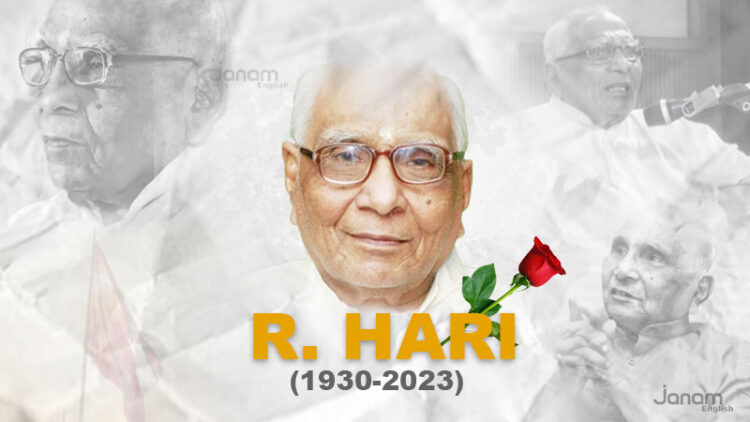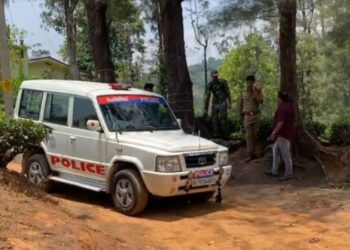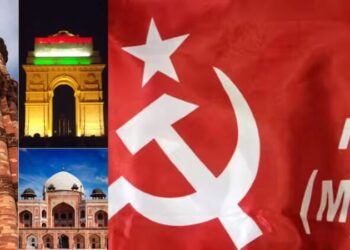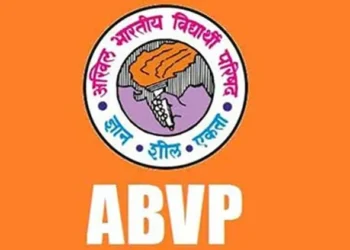Shri Ranga Hariji alias R. Hariji aka Hariji is one of the senior most RSS Pracharaks in the country and highly respected thinker. He was born on December 5, 1930 (Rohini, Vruschikam). He was jailed in Kerala from December 1948 to April 1949 as a satyagrahi; satyagraha was launched demanding lifting of the illegal ban on RSS which was imposed in connection with Mahatma Gandhiji assassination. It broke his studies as a BA (Politics, History & Sanskrit) student. After the release from the jail in the wake of the lifting of the ban on RSS, Hariji continued his studies. After passing his BA, he studied Sanskrit separately. Then he came out as a Prachaarak of Sangh on May 3, 1951. For an year he worked as a Taluk Pracharak. Later on he was assigned to work as Jilla Pracharak in various districts and later on Vibhag Pracharaks in various parts of Kerala.
During Emergency and ban on RSS (June 25, 1975 – March 21, 1977) Hariji was one of the three senior most underground leaders of RSS and Lok Sangharsh Samiti (LSS) in the state. Pranth Pracharak K. Bhaskar Rao and senior Pracharak P. Madhavji were the two others. The trio led the entire Sangh organisation underground in the state. During those darks days of our country’s history, Hariji was in charge of Kurukshetra, the underground fortnightly Lok Sangharsh Samiti brought out and distributed from underground in Malayalam in the state. (RSS and LSS brought out similar journals in all states in vernacular. The common people, bureaucrats, police officers and both anti-Emergency and pro-Emergency politicians depended on them for accessing the real news in the wake of the strict black censorship hence pro-regime news alone could be carried in the media).
Post Emergency, Hariji was assigned to launch Kurukshetra, the publication wing of RSS in Kerala. In 1980, Hariji took over as the Kerala Pranth Boudhik Pramukh and in 1981, Acting Pranth Prachark when Bhaskar Rao had to take rest due to cardiac ailments. He worked as the Prant Pracharak of Kerala from 1983 to 1994. In 1990, Hariji was selected as Akhil Bharateeya Sahaboudhik Pramukh and Boudhik Pramukh in 1991. He continued in that position until 2005. He was the Prabhari of Hindu Swayamsevak Sangh in Asia and Australia from 1994 to 2005. In this connection, he toured in 22 countries belonging to five continents.
Hariji participated in the world conference of Pre-Christian Religions in Lithvania in 2001 and later on two times in Bharat in 2005 and 2006. Then he continued as the member of Akhila Bharateeya Karyakari Mandal of RSS. Since 2006 he has been working in consultative capacity without any official responsibility.
Now, 93 years old Hariji, after retiring from the routine RSS activities, has been devoting his time for writing and giving lectures when health allowed.
Hariji enjoyed excellent proficiency in Malayalam, Sanskrit, Hindi, Konkani, Marathi, Tamil and English. He is a prolific writer and has penned several books in Malayalam, Hindi, English and in Konkani. He has also compiled three books in Malayalam and one huge collection of Shri Guruji’s works – ‘Sree Guruji Samagra’ in Hindi in 12 Volumes. He has written the biography of Sree Guruji in Hindi. Hariji’s work on late K. Bhaskar Raoji is the most authentic analysis of the calibre of that legendary Pracharak.
‘Sree Guruji Samagra’ is perhaps the most significant work ever on a single personality. He selected most significant ones from among thousands of letters Guruji Golwalkar had written during the thirty three years long regime as the second Sarsanghchalak of RSS (1940 – 1973). Guruji had a unique character of having all his outgoing letters, which were written and despatched from Nagpur, copied by an aide before despatching. He used to write letters in English, Hindi and Maratti. They were copied in several big and heavy (accounts ledgers) books. The copyist used to write the date of the letter, date of despatch and even the price of the postal stamp used. Hariji once jokingly told this author that those records could tell one the ‘evolution of prices’ of the Bharatiya Postal stamps.
Hariji read them verbatim hence extracted lot of vital information regarding the history of Sangh. It reversed the general understanding that Datho Panth Thengidiji launched first RSS Sakha in the territory of present day Kerala. Thengidiji started the first Sakha in Kozhikode, Kerala in 1942. But Hariji traced from the letters of Guruji that a Madhya Pradesh native Pracharak called Thelakji started Sakhas in Thiruvananthapuram and Kollam districts in 1941 and even took a swayamsevak to Nagpur to attend Sangh Shiksha Varg, the one month-long training camp. During his next tour to Madhya Pradesh Hariji found out the location of Thelakji and visited him. The good old man was amazed to see the Akhil Bharaitya Boudhik Pramukh visiting him; his surprise was beyond leaps and bounds as the Sangh leader was from the part of Bharat where he (Thelakji) went to start Sangh work during his tender young age.
In connection with Guruji’s centenary, Hariji led a team of Nagpur-based people during 2004 – 2006 for compiling the 12 volume Guruji Samgraha and organised successfully the translation of the original Hindi work to all Indian languages. And, he was too particular not to mention his name anywhere in any volume, not even in the introduction. When others failed to make him agree to the proposal, at last the undersigned was asked to talk to him, to exploit the excellent rapport we had in between (as a last resort). But, he would not give in. He said, complete works of neither Swami Vivekananda nor Mahatma Gandhiji carry the names of the people involved in their compilations. At last, the undersigned took out the last weapon from my sheath: ”Hariji, the task you have accomplished is Herculian. The posterity should know the efforts behind it. Then only they will cultivate initiative to shoulder these sorts of heavy assignments”. Pat came the answer: “Someone will do it when he writes the obit”. My attempt turned futile !
During the same assignment, Hariji explored Guruji’s diary which contained the chronicles of the manthradeeksha he received from Swami Akhandanandaji, his Guru and Gurubai of Swami Vivekanandaji, one of the fifteen disciples of Swami Vivekananda. From one of the letters, he learnt that during early 1973, Guruji had sent the idol of his Kuladevata and the personal belongings of Swami Akhandanandaji, his Guru, to his relation living in Poone. Guruji had been carrying them with him during his constant extensive and intensive nation-wide tours since he left Saragachi Ashram, in 1937, to join the mainstream RSS activities. Guruji sent them to Poone when he felt that his health had deteriorated to the rock bottom level hence he was unable to carry out the daily pooja of them. Since Hariji could get the address of the ‘other Golwalkar’, he went to his residence during his next organisational tour to Pune. He saw those noble articles Guruji had handed over to his relation to carry out the pooja in his absence. Then the gentleman said to Hariji that he could perform pooja on them. He complied. He has told about it and recorded them in emotionally charged language. Hariji told that Guruji had defined the day he got manthradeeksha as the “Red Lettered Day in his life”.
Since the retirement from the national responsibility of RSS nearly one and half decades ago, Hariji has been giving a unique direction to the ideological face of Sangh. The way he analyses the issues and the speed he shows in finding out solutions to the ideological affairs are unparalleled. His photographic and computer-like memory power is always there as sterling advantage.
Despite his retirement, RSS top brass has been consulting him regarding significant issues. K.S. Sudarshanji, the former Sarsanghchalak considered Hariji as a guide in connection with the top organisational matters. To the best of the undersigned’s knowledge, Dr. Mohanji Bhagavat has been continuing the same. A multilingual personality, he conversed in almost all Bharatiya languages. An exemplary orator, he could speak in several languages, viz., Malayalam, English, Hindi, Maratti, Sanskrit, Konkini, Tamil, etc.
Hariji is a source of inspiration, knowledge, wisdom and vigyan for the entire nationalist forces in general and RSS-inspired organisations in particular. Even though he is not a public face and even though his popularity is confined to the ranks of RSS and Sangh-inspired organisations, the intellectual contributions he made could create qualitative tremors of high magnitude in the ratiocinative sector of the nation. He gave a new definition to the cultural nationalism, the pet paradigm the Sangh-inspired organisations, especially BJP, have been nurturing and propagating. Various nationalistic reforms the NDA regime has been implementing since its very inception had originated from the intellectual manthan (churning) Sangh has been practising since the last couple of decades. And, Hairji was always at the helm of that thought process.
Hariji was not only an intellectual giant but also a master organiser. After the days of great Pranth Pracharak K. Bhaskar Raoji, Hariji’s contribution to the development of RSS and other nationalist forces in Kerala are beyond words. Now, as Kerala is the haven for all anti-national forces, a specific question always arises: “What would have happened if there is no RSS here”. That is the significance of Hariji’s contributions. He continued the work of Bhaskar Rao, that is, building the movement brick by brick. When he was assigned to take up the Akhil Bharatiya responsibility, he continued what he did in Kerala, but, in a larger dimension.
Hariji’s range of works varies from organisational matters to epics to history to philosophies. The biography of Guruji Golwalkar is one of the best books brought out on Guruji. His interpretation of Vishnu Sahasranamam” is quite useful to all sorts of devotees. Hariji’s Bhagavat Gita Nikhandu (dictionary) is a unique work. It helps one to read Gita even though he lacks basic knowledge of Sanskrit. “Awake, Awake, Great India”, quotable quotes of Sister Nivedita is the product of his thorough study of the 2500 page complete works of Sister Nivedita.
Ranga Hariji’s books are specific investigations into various dogmas and concepts generations after generations have been reading, learning and storing in their mindscapes. His mind and eyes are scanners of supersonic speed and microscopic and surgical precision. That is why he came out with flying colours in his endeavour in demolishing several ages-long wrong beliefs and understanding with respect to our epics. “Mahabhaaratam : Parayappedaatha Nerukal” (Untold Realities in Mahabharata) is a classic example for this. There he demolishes the theory that Mahabharata war originated from the situation where Droupathi kept on laughing loudly when Duryodhana was confused between water and floor and fell down several times in the palace built by Asura Architect Maya for Pandavas. After hair-splitting studies Hariji established that Droupathi was not present there while Duryodhana kept on falling, let alone she laughed. According to him, Vyasa Bharata does not mention the presence of any woman at that moment.
Hariji wrote several books on Ramayana and Mahabharata. They gave novel dimensions to various characters contrary to the age-long concepts. “Mahabharathathile Yudhishtiran” (Yudhishtira of Mahabharatha) is another example which gives more importance to Yudhishtira. “Mahabharathathile Karnnan” (Karnnan of Mahabharatha) was an entirely different intro to Karnna. “Mahabharathathile Virudar”, “Vyasa Bharathathile Droupadi”, “Vyasa Bharathathile Bheeshmar”, “Vyasa Bharathathile Naradan”, and “Vyasaharathathile Sreekrishnan” are introducing those divine heroes from a fresh angle. “Ramayanathile Subhashithangal”, “Bharathasthreeyude Innalekal” (Yesterdays of Bharatha Women), “Bharathsahithyathinte Ananthapravaham” (Eternal flow of Mahabharata) “Valmeeki Ramayanam: Akavum Porulum” (Valmeeki Ramayanam: Interior & Exterior) is an excellent study on Ramayana. “Ramayanathile Subhashithangal” is a superb account of quotable quotes.
Biography of Guruji Golwalkar and stories from RSS founder Dr. Keshav Baliram Hedgewar’s life give deep insights of the history of RSS. “Sree Bhadrakali Charithram” is another work regarding a divine faith. “Mattuvin Chattangale” is a clarion call to throw away the obsolete conventions and customs). “Vande Bharathathinte Kadha” is the right presentation of the days of freedom struggle and the significance of the national song.
“Ini Njan Unaratte” (Let me wake up) is a compilation of articles aimed at grooming the youths in the right perspective. “Rashtravum Samskaravum” is a study on the link between the nation and her culture.
Hariji has done translation of several important works, to Malayalam, from other languages. Hariji had translated Ek Nath Ranadeji’s “Rousing Call to Hindu Nation” into Malayalam in early 1960s in connection with Swami Vivekananda’s birth centenary celebrations. Hariji’s another serious translation into Malayalam is “Rashtrachinthanam Vedangalil” from the Hindi work of Sree Pada Damodar Satvetkar (Translation). It explains the origin of the concept of nation and nationalism in Vedas.
Here is the list of the books authored by Hariji:
1. Translations into Malayalam:- 9
From English:
Uttishta Bharata(1963) Swami Vivekananda’s Rousing Call to Hindu Nation.
From Marathi:
Keshava Sangha Nirmata (1979) (of same name by C. P. Bhisikar.)
From Marathi:
Dr. Hedgewar’s selected letters (Compiled by B. N. Waradpande.)
From Marathi:
Evolution & Development of Sangha Karyapadhati (Compiled by B. N. Waradpande.)
From Marathi:
Selected essays from – (Hindu Samskriti by Pt. S. D. Satvalekar.)
From Marathi:
Exhaustive Biodata of Dr.Hedgewar (by Dr. S. A. Godbole.)
From Sanskrit:
1) Shankaracharya’s Prasnottari – in poem
2) Loukika Nyayanjali (by Col. Jacob (1905)
From Hindi:
Nation Concept in Vedas – (by Pt. S. D. Satvalekar)
2. Compilations – 10
In Sanskrit:
Bheeshma Geeta (Under Print)
In Malayalam:
1) Anti Emergency Struggle in Kerala. (Papers & Documents.)
2) Martyrs & Sufferers of Anti Emergency Struggle in Kerala. (Experiences.)
In Hindi:
1) Sree Guruji Samagra – 12 – Volumes. (2005.) (Nagpur Publication.)
2) Pracharak Pathey – Selection from Guruji Golwalkar’s letters.
3)Sri Guruji Drishti and Darshan.(Selections from 12 volumes mentioned above.)
In English:
1)Translation of the same in English – Sri Golwalkar – His Vision & Mission.
2)Arise, Awake (Nivedita’s Quotes)
In Malayalam & Hindi:
Ramayanathile Subhashitangal (Subhashitams from Ramayana)
3. Original Compositions – 43
In Malayalam. (Titles translated.)
1. Dr. Hedgewar through Anecdotes.
2. To Youth (32 pieces)
3. Let Us Awaken
4. RSS and Hindu Awakening.
5. Sri Golwalkar – A Biography
6. At the Feet of Mother – Elucidation of Sangh Prayer.
7. Auto Biography of Vandemataram. (History of freedom struggle)
8. Commentary on Vishnu Sahasranama.
9. Dictionary of Bhagavadgeeta words.
10. Rashtram & Sanskriti.
11. Vicharasarani (Special view points of Sangh founder) -1989
12. Commentary on Narasimha Stuti of Narayana Pandit.
13. Volga merges into Ganga
14. History of forceful conversion in Goa – History speaks.
15. Studies in Valmiki’s Ramayana.
16. Untold Truths in Mahabharat
17. Sree Krishna of Mahabharat
18. Off With The Outmoded Customs
19. Biography of K. Bhaskarraoji
20. Kesavashtakam – An Explanation
21. Karna as Told by Bhagavan Vyasa
22. Mahabharatathile Draupati
23. Nalmozhi Thenmozhi
24. Mahabharathathile Vidurar
25. Nanmozhi Thenmozhi
26. Mahabharathathile Naradar
27. Vyasabharathathile Bheeshmar
28. Vyasabharathathile Yudhishtiran (Under Print)
29. Paramahamsa Prathidwanikal (Under Print)
In Hindi
1. Dharm ki Avadharana
2. Samarpan.
3. Apna Keral (1984)
4. Ma Ke Charanompar
5. Sri Guruji – Jeevan Charitra
6. Smriti Parijat – ‘Guruji Keral mein.’
7. Dharma Aur Sanskriti – Ek Vivechana
8. Matantaran Paravartan Aur Atmasatkaran
9. Pathik Aur Pathey – Vimarsh Prakashan – New Delhi
10. Hum Nirmankara he ya srujanakartha – Vidyabharati – Kurukshetra (2019)
11. Bharatiya Naree – Ek Vihangam Avalokan– Drushti Stree Adhyayan Prabodhan Kendra, Pune – 9 (2019)
12. Bharat ke Rashtratva ka Anant Pravah
In Konkani
Visthapanachi Katha (Exodus from Goa) (Khanda Kavya)
In English
1) Thoughts on Jnaneswari – The Maiden Translation of Gita
2) Prithivi Sooktam – explained (Under Print)














Comments